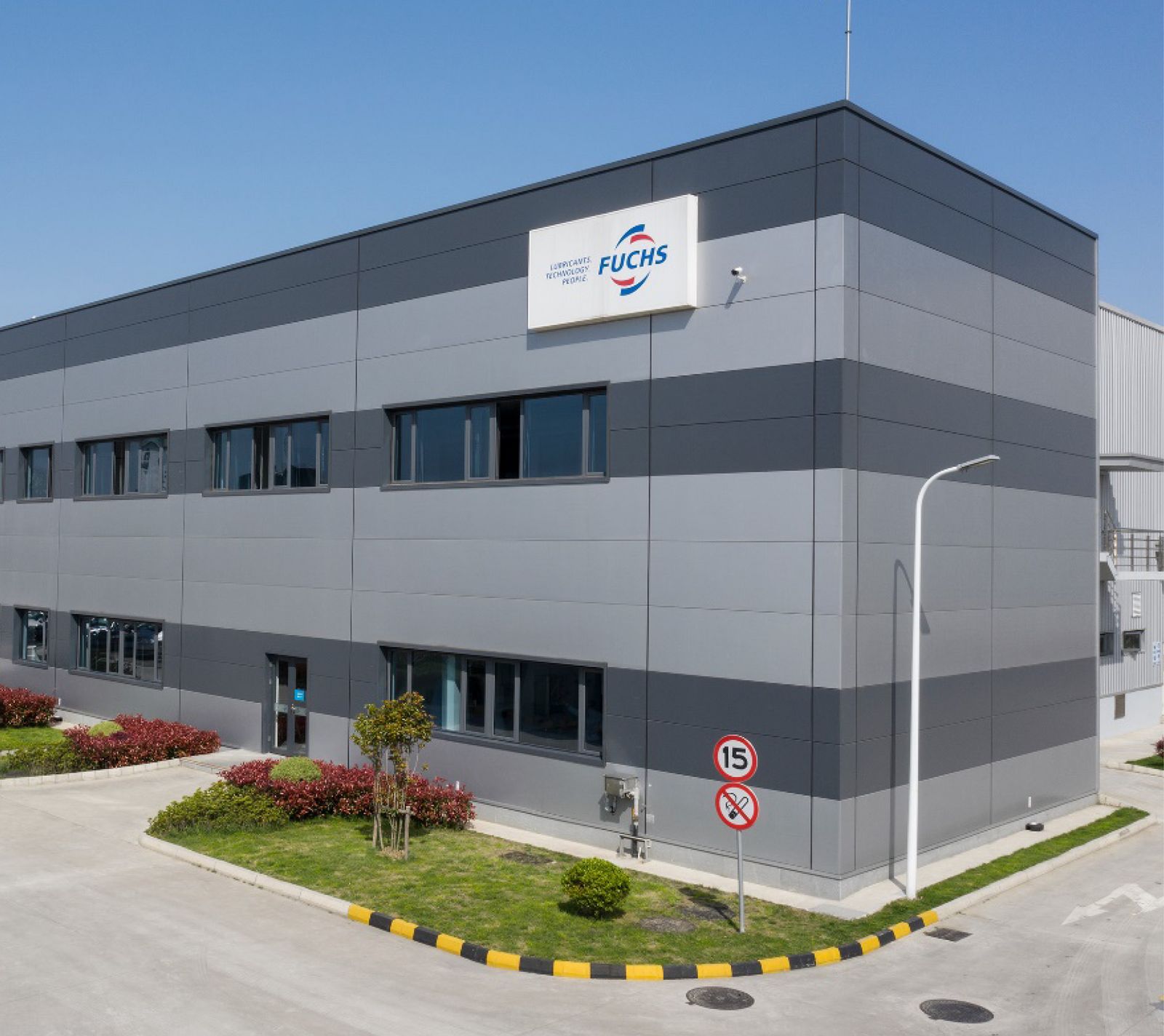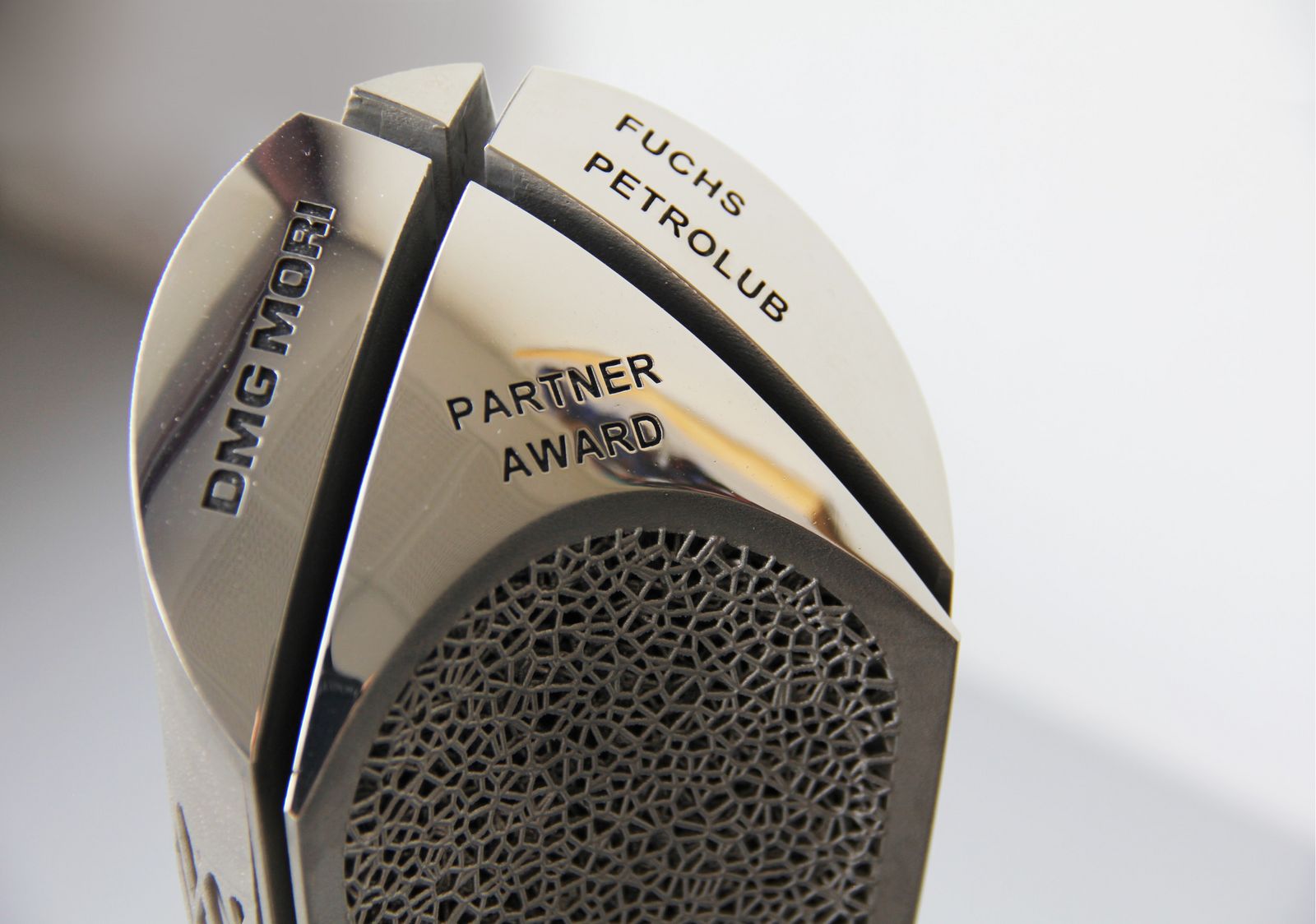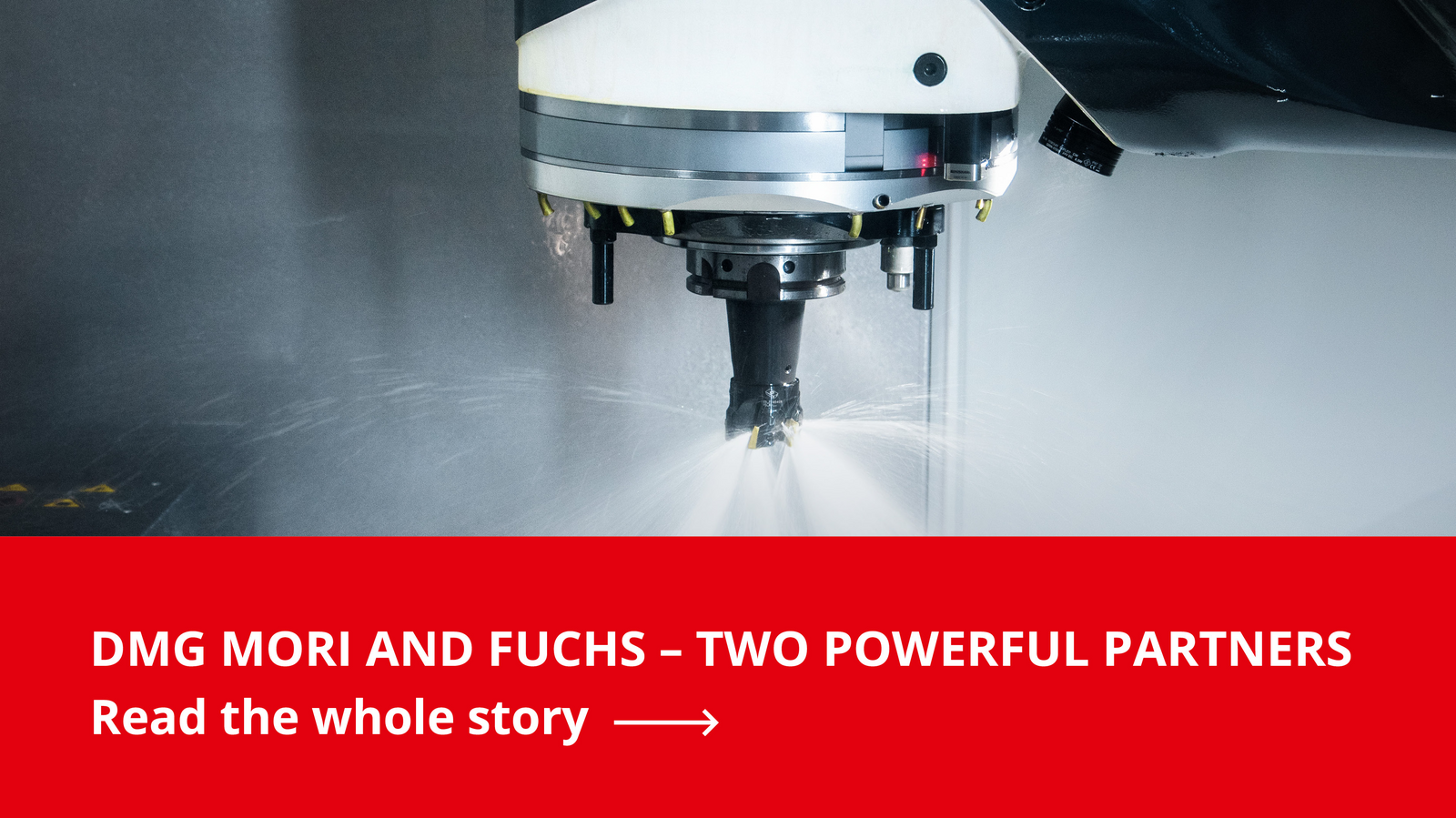PREFERRED PARTNER FOR THE WORLD
Since 2014, FUCHS SE and DMG MORI have been working closely together – initially on customer projects in Asia and, since 2017, in the form of a comprehensive technology partnership. Their shared objective is to secure future-oriented further development of lubricants and services in the machine tool sector.
DMG MORI Qualified Products Program (DMQP) is the name of the program in which DMG MORI and FUCHS have consolidated their cooperation. FUCHS has been a certified DMQP partner since 2019, offering both cooling and general lubricants matched exclusively to machines and processes. In an interview, Christian Thönes, Chairman of the Executive Board at DMG MORI AKTIENGESELLSCHAFT, and Stefan Fuchs, Chairman of the Executive Board at FUCHS SE, talk about their intensive cooperation.
What aspects motivated you to keep extending the partnership between DMG MORI and FUCHS – right through to DMQP certification?
Christian Thönes: During the first joint customer projects in China and Asia, we were able to successfully solve individual tasks together with FUCHS. Already back then these initial solutions showed a high degree of relevance for other companies too – with the corresponding scalability potential. The success scenarios then ultimately led to an ever closer partnership with FUCHS. Both parties continue to benefit from this partnership to this day and have worked on dozens of development projects, for example in the field of spindle development.
Stefan Fuchs: Another reason why the partnership works so well is that both DMG MORI and FUCHS are global enterprises with many thousands of staff and have adopted a decentralized structure. Indeed, FUCHS alone is represented with 58 operating companies throughout the world, while DMG MORI is known for its worldwide Technology Excellence Centers. As such, we employ a very similar approach in our day-to-day business and this obviously also simplifies the cooperation.
58
The number of operating companies FUCHS has worldwide. Another reason why the partnership with DMG MORI works so well is that both companies are global enterprises with many thousands of staff and have adopted a decentralized structure.


Based on the longstanding partnership and DMQP certification, DMG MORI and FUCHS today cooperate closely at various product and service development levels. What changes has this brought about for the two partners and – above all – how do customers benefit from the partnership's combined offering?
Stefan Fuchs: In terms of the “inner workings”, we have always enjoyed an evolved and trusting cooperation. In principle, very little has changed in this regard. However, joint development of scalable solutions for specific requirements profiles has led to an ever sharper focus on customer benefits. This in turn serves to highlight just how well the two companies fit together. We are keen to provide customers with full-scope support.
Christian Thönes: I can also confirm this. We now enjoy intensive exchange of knowledge, experience, and ideas at all levels of our two companies. As partners, this clearly makes us both stronger. More importantly, however, it also makes our common customers ever stronger, as we repeatedly develop innovative business models throughout the entire added value chain. For example, the integrative technology cycle that covers everything from material supply to disposal, as well as our DMQP Program grant customers direct access. This applies equally to the excellent lubricants, greases, spindle and hydraulic oils from FUCHS, as well as those that are developed together. This integrative approach in turn helps our customers become even more successful.


“We now enjoy intensive exchange of knowledge, experience, and ideas at all levels of our two companies. As partners, this clearly makes us both stronger.”
CHRISTIAN THÖNES, CHAIRMAN OF THE EXECUTIVE BOARD AT DMG MORI AKTIENGESELLSCHAFT
Many customers see cooling lubricants as a kind of “black box”. So how do you address and clarify this often misunderstood topic?
Christian Thönes: With our sales team and local expertise, we already support customers in selecting and designing a manufacturing solution, for example at the worldwide Technology Excellence Centers. This involves choosing the right cooling lubricant and then ensuring that it is optimally matched to the respective application, component, and machine.
Stefan Fuchs: We support DMG MORI in this context with experts on site, as well as laboratory capacities that permit precise analysis of the applications. Working together with DMG MORI service engineers, we investigate the respective issue in depth and offer training sessions hosted by FUCHS application engineers in the form of workshops or video conferences.
Are there any examples of cooling lubricants that have come about on the basis of this kind of cooperation?
Christian Thönes: Yes, the DMQP cooling lubricants ECOCOOL TNA-IDM, ECOCOOL AFC-IDM, and ECOCOOL S-FC IDM are good examples of this. These represent a key technology component and guarantee higher performance, a longer service life, and better repeat accuracy for our customers. With their special characteristics, they help customers achieve better energy efficiency and thereby improve the sustainability of the machining process.
What does that mean for real world operations?
Christian Thönes:In concrete terms, the greater the stress during machining, the greater the impact of the cooling lubricant on the machining result. Set against this background, machining of metals such as titanium or nickel-base alloys, for example in the aerospace sector, is considered one of the key disciplines. Yet cobalt-chromium alloys, such as those used in the medical engineering sector, also have strict machining requirements.
Stefan Fuchs: Regarding this, we recently initiated a benchmark test for cooling lubricants as part of the innovative cooperation with the DMG MORI Aerospace Excellence Center. Users now benefit from a significantly more homogeneous wear cycle in practical applications as a result. This in turn improves both machine performance and process stability. In addition, wear is reduced by up to 85 percent on both the main cutting edges and the corner radius.
You are generally keen to emphasize the sustainability of the FUCHS solutions. What role does this play with regard to the partnership?
Christian Thönes:For years now, sustainability has been a relevant future field in the business strategy of DMG MORI – and I believe also of FUCHS. The strict demands also apply, without any restrictions, to our technology partnership. Furthermore, as a matter of principle all lubricants used must be effective, economical, robust, as well as free of any ingredients that are potentially harmful to health or the environment.
Stefan Fuchs:In addition to this, we are working intensively in a large number of joint product-related and process-related development projects to sustainably reduce the ecological footprint associated with lubricants for and at our joint customers. Beside use of resource-saving and environmentally-friendly products, the environment in which they are used obviously also has a key role to play here.

“FUCHS and DMG MORI have been manufacturing their products on a carbon-neutral basis since 2020. We are just as focused on developing sustainable products, too.”
STEFAN FUCHS, CHAIRMAN OF THE EXECUTIVE BOARD AT FUCHS SE
Can you provide any specific examples of sustainable developments?
Stefan Fuchs: Well, first of all it is important to stress that both FUCHS and DMG MORI have been manufacturing their products on a carbon-neutral basis since 2020. However, we are just as focused on developing sustainable products. A good example of this is our joint involvement in the project entitled “BIOMANU III: Machine Surfaces in Interaction with Cooling Lubricants”. The focus here is on development of a qualified microbial and bio-based cooling lubricant, integrative fluid management for coolant circulating systems, and the lotus effect on surfaces. This can minimize soiling. FUCHS supports the project from the chemical side and with its cooling lubricant expertise.
Christian Thönes: Lubricants also make a contribution to reducing carbon footprints – partly through selection of the raw materials and supply chains, yet also thanks to use of the latest formulations. These allow thermal absorption and frictional forces to be reduced, which in turn optimizes the energy balance of the entire machine. Last but not least, we have sustainably optimized the logistics chain of DMG MORI Spare Parts GmbH.
What does this mean?
Christian Thönes: Let us consider our global alignment. In the past, even small quantities of lubricant were shipped throughout the world from the central DMG MORI spare parts centers. In the meantime, however, procurement is performed along short routes via the globally networked production, sales, and distribution network of FUCHS (via DMG MORI), whereby most of the lubricants are generally produced regionally.
Stefan Fuchs: One thing that I am particularly pleased about is the fact that we can guarantee the customers of DMG MORI end-to-end sustainability via our preparation and disposal options. These are key components of our technology expertise and represent a special characteristic of the DMQP materials cycle.
Does DMG MORI now exclusively recommend FUCHS lubricant solutions?
Christian Thönes:We actually do recommend FUCHS lubricants. FUCHS is capable of supporting both us and our customers with its extensive product portfolio, as well as holistic and integrated cooling lubricant/lubricant management. When you put all of the customer benefits together, this is what really makes our technology partnership so special.
Stefan Fuchs: Besides saying thank you for the kind words, there is not much for me to add regarding the excellent cooperation between the two companies.
What can customers expect from the technology or DMQP partnership in future?
Christian Thönes:Two important aspects of the partnership are continuous improvement of the products and services, as well as increasing market presence and market shares – in particular with a view to Japan, China, India, or also the US. The third important pillar is promotion of joint development projects – among other things in the environment of industrial digitization...
This merits an explanation…
Stefan Fuchs: Cooling lubricants have a major impact on machining results. However, even the best cooling lubricant is subject to wear which, in certain circumstances, can adversely affect the process. This is precisely where digitization comes into play. We are therefore currently working on an innovation project, the FLUID ANALYZER IDM. This sensor technology aims to generate added value for customers in terms of product and process stability.
How exactly does the FLUID ANALYZER IDM work?
Stefan Fuchs:Special sensors analyze the condition of the cooling lubricant during the process and then visualize it accordingly on the machine control system. This makes it possible for customers to take proactive action and implement optimizations when cooling lubricant parameters change. The whole approach works as a single-machine or multi-machine use case. It is also possible to retrofit existing machines with the FLUID ANALYZER IDM.
Christian Thönes:This joint project in particular shows just how seriously we take the topic of digitization. We actually already offered a brief teaser on the topic to a selected group of potential customers for the first time at the start of 2020 during the in-house exhibition in Pfronten. The response was simply overwhelming. In future, we will be going one step further by working together on development of an as-a-service subscription concept for the lifecycle of both general and cooling lubricants.
What does this mean for customers?
Christian Thönes:These kinds of as-a-service solutions represent a real benefit for customers, who can then get everything from a single source. This in turn provides them with absolute planning reliability, meaning that they can rely one hundred percent on production of their components.
Stefan Fuchs:The complete revision of the concept brought about by the subscription approach will also result in the development of a new lubricant sensor technology 2.0.This improved sensor technology will focus on the key benefits for customers and facilitate a setup that is suitable for the mass market in terms of pricing and sales model.
What else can users expect from the cooperation between DMG MORI and FUCHS?
Christian Thönes:The industry-specific cooperation in the aerospace and medical sectors will be extremely important. Cooperating in joint workshops, our experts will draw up solution approaches that are specifically aligned to customer requirements.
This cooperation is also bringing the Medical Excellence Centers in Seebach, Chicago, and Shanghai closer together. Some initial pilot projects have already emerged from the conceptional idea and are displaying highly promising results, for example in the aerospace industry. So our customers have a lot to look forward to. As do yours, Mr. Fuchs. We certainly have plenty of exciting work ahead.
Stefan Fuchs: That's right, also in terms of the regions in which we are looking to further intensify our technology partnership. We are fully on board and obviously look forward to further cooperation with you and your team.
“Partner Award 2021” for FUCHS
DMG MORI awarded FUCHS PETROLUB SE the “DMG MORI Partner Award 2021” for outstanding services and innovative power. “A good partnership proves itself in challenging times: Under the current extremely difficult material supply conditions in particular, the trusting and reliable teamwork has become even more important.” emphasizes Christian Thönes, Chairman of the Executive Board at DMG MORI. Stefan Fuchs, Chairman of the Executive Board at FUCHS PETROLUB SE: “Our shared goal has always been to set standards with innovative product developments in the area of lubricants for machine tools. Ultimately, we all benefit from this endeavor: DMG MORI as a machine tool manufacturer, FUCHS as a lubricant producer, and in particular our shared customers.”
Since 2019, FUCHS has been the official lubricant partner of the DMG MORI Qualified Products Program and received the award in this category.

